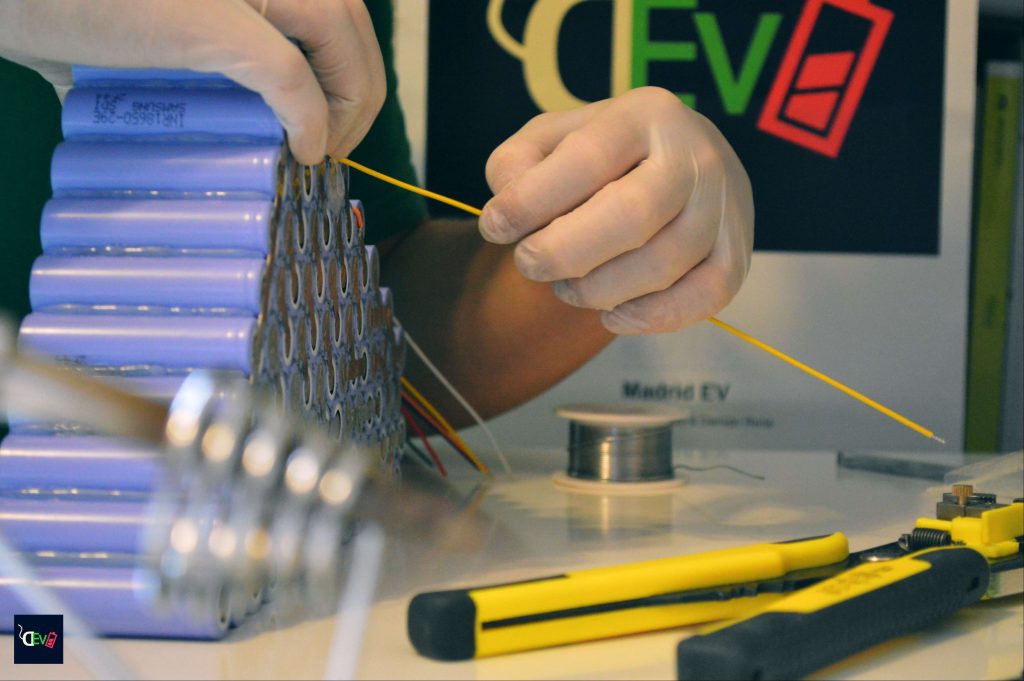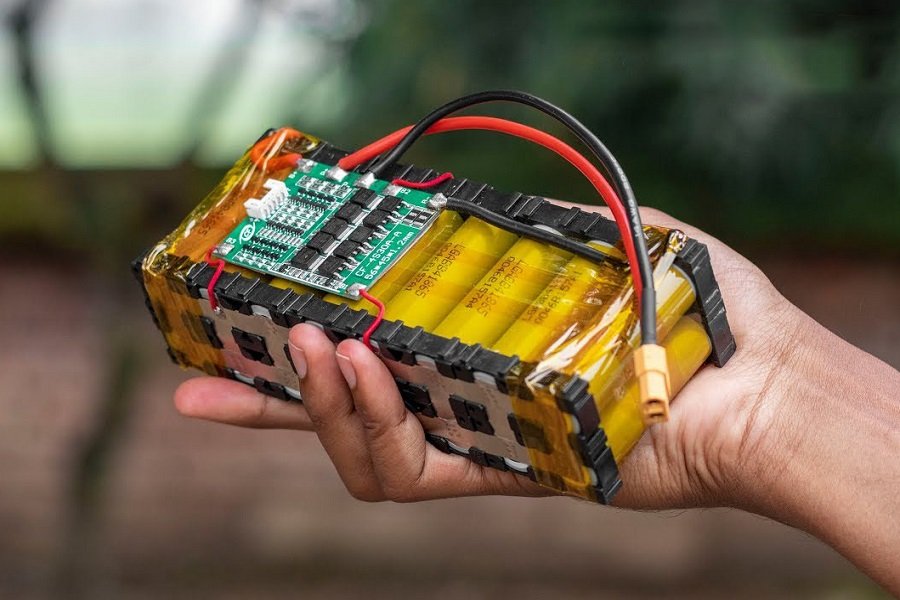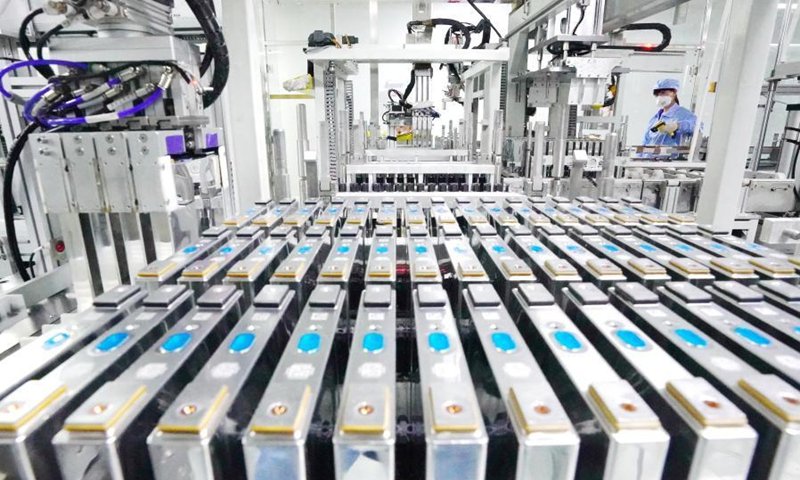With so much information on the Internet, more and more people are trying to DIY lithium batteries themselves. After all, lithium batteries can be expensive, and it can be cheaper to make them yourself. But regardless of why people do it, making your own batteries is extremely dangerous.
In this article, we’ll explore what a lithium battery is, whether you can make it yourself, and why it’s not worth the risk.

What is a lithium battery?
Lithium-ion batteries are an advanced type of electrochemistry that use lithium ions to power our handheld devices, vehicles, RVs, and everything in between. They consist of an anode, a cathode, and a battery electrolyte solution that transports ions from anode to cathode (when discharging) and from cathode to anode (when charging).
Lithium batteries have changed our world because of their high energy density, and as a result, they allow us to pack large amounts of electricity into small compartments. Also, they can put out more power overall because they are not as affected by the Peukert effect as lead-acid batteries.
Is LiFePO4 the same as lithium-ion
The LiFePO4 battery has the edge over lithium-ion, both in terms of cycle life (it lasts 4-5x longer), and safety. This is a key advantage because lithium ion 18650 batteries can overheat and even catch fire, while LiFePO4 does not.
How do you make lithium?
The majority of the world’s battery-grade lithium is produced by one of two means: Mining & acid leaching from spodumene ores, i.e. Lil(SiO3)2, producing lithium sulfate solution, which is then converted to battery-grade lithium carbonate or hydroxide via electrochemical processes.
Can we make lithium
For most of us, lithium batteries work so well to power our devices, gadgets, and vehicles that we don’t give them much thought. But in some cases, a question may be raised: Can I make my own lithium battery pack?
For example, making DIY lithium starter batteries could be popular among people who want to power devices such as bicycles, skateboards, or other motors. This is because lithium starter battery is generally more expensive than lead-acid alternatives, and may be cheaper to make yourself.
So yes; it is possible to build your own lithium battery pack. But should you? Maybe not.
Let’s take a look at why building your own lithium battery is not a good idea.

Why is building a DIY lithium battery a bad idea
Let’s explore why you should think twice before building your own lithium battery. As you read, keep in mind all the safety features and tests that battery manufacturers perform when they make batteries. Ask yourself: Can I produce the same results as the factory? The answer may be no.
Battery manufacturers have honed their testing and assembly processes – which are hard to replicate in DIY Lithium battery builds.
DIY work without any warranty or guarantee
So what happens if your battery fails and damages your electronics beyond repair? The problem with building a DIY lithium battery is the lack of warranty.
Most devices offer some protection against these situations, but not for self-built batteries. As a result, your battery is at a higher risk of failure and can suffer serious damage no matter what power source you’re using.
No testing/quality control
As mentioned earlier, premium battery manufacturers such as Maxworld Batteries conduct rigorous testing to verify battery performance and ensure the safety of their products. However, if you make your own batteries, you may not be able to replicate the tried and true battery testing methods used by manufacturers.
Additionally, batteries like Maxworld have external certifications that require rigorous safety testing. Each battery has a 38.3 Department of Transportation listing, which is required even to allow them to be shipped.
Without testing, you may not know there is a problem with the battery until it is too late. And you may not have the equipment, knowledge or manpower to conduct these tests yourself.
Unmatched cells, volt, and amp packs
Another possible problem is the battery structure. Problems can easily arise if the battery cells aren’t emitting power evenly, the motors aren’t drawing the correct amperage, or the bus bars can’t handle the amperage going through them. These are risks when building your own lithium battery pack.
Instead, every Maxworld Battery battery is load tested before assembly. Each finished battery then goes through quality control testing to ensure they meet our stringent voltage and amp-hour standards.
Lithium battery testing and matching is a critical step in building a reliable and safe Lithium battery.
BMS reliability
If you’ve researched how to build your own DIY 12v lithium-ion battery pack, you’ve probably heard of battery monitoring systems (BMS). BMS is an important part of lithium-ion batteries. They make sure the battery is working properly by monitoring it. Depending on the manufacturer, items such as temperature, load, voltage, SOC, resistance, and current are measured. If something goes wrong, the BMS disconnects the battery to keep it safe.
So if you don’t have a reliable BMS, you won’t know if your battery is working properly. Also, if it fails, you have no safety features.
Maxworld Batteries use a proprietary BMS designed for our battery packs, highly tested and designed to last for the life of the battery.
Lithium battery fire is difficult to put out
The last point is the worst-case scenario, but unfortunately, that’s the reality of lithium-ion batteries.
First, lithium batteries pose a fire risk if not manufactured properly due to their high energy density. If one of the batteries fails (which can happen if not manufactured properly), the heat generated can set off a chain reaction called thermal runaway.
Depending on how many cells are in the battery and how well they are ventilated, this can lead to unmanageable fires.
Homemade battery packs worked well for a while, but it’s not uncommon for future self-ignitions due to construction flaws.
So, you may be inadvertently making dynamite while trying to make a cheap DIY battery.

Should you risk building your own lithium battery
You know the saying: “I know enough to be dangerous”?
Consider that this might work for you building your own Lithium battery. If you know the basics of building a battery and think you can get by with the right research and materials – reconsider. DIY lithium batteries can be very dangerous if not made correctly, and a lot of things can go wrong.
So if you ask us, please don’t do it. Not worth the risk. While you might say we’re biased, you’d be surprised how many stories our customer service and tech support teams hear about DIY attempts. Often, these same DIY builders end up replacing their homes due to unreliability, peace of mind, and sometimes the worst of a fire.

Conclusion
Lithium batteries are amazing! Their high energy density has allowed us to store energy in a small and portable way, and as a result, has revolutionized our world.
However, they can be very dangerous if not built correctly. All kinds of things can go wrong, including thermal runaways, and ultimately, fires that are hard to put out. That’s why we strongly advise against trying to make your own DIY lithium battery. Not only can it destroy your personal property, but it can also endanger your safety and the safety of others. If you want to get a DIY lithium batteries pdf, Please contact Maxworld Power.

